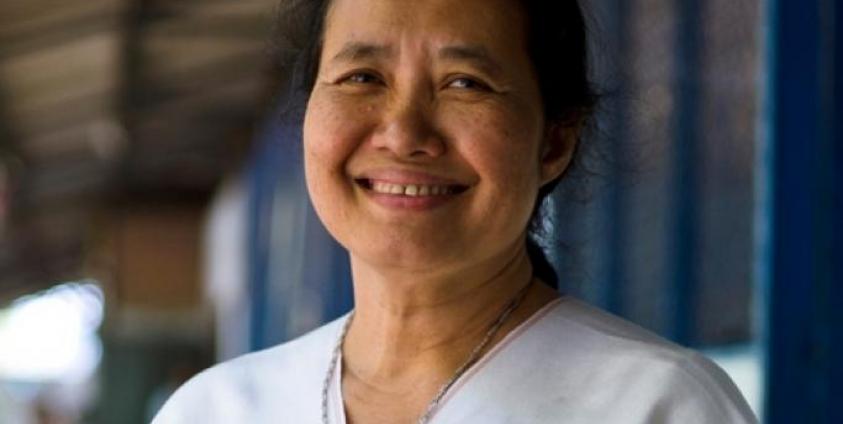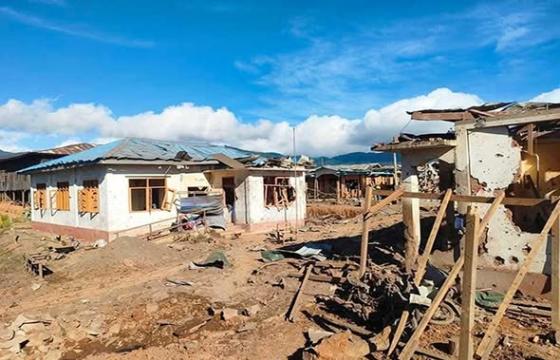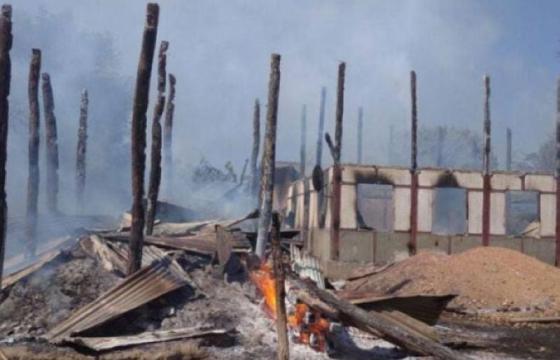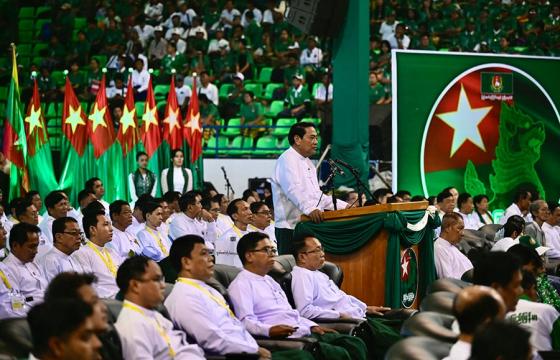It is fitting that once again a female Burmese doctor has been recognized for her work.
Dr Cynthia Maung, the founder of the Mae Tao Clinic, in Mae Sot on the Thai-Myanmar border, was awarded the South Korean May 18 Memorial Foundation’s Gwangju Prize for Human Rights 2022, on 3 May.
According to the May 18 Memorial Foundation the Gwangju Prize for Human Rights is awarded to “individuals, groups or institutions in Korea and abroad that have contributed in promoting and advancing human rights, democracy and peace through their work.”
This is the latest in a long series of awards given to Dr Cynthia, who is well enough known to be just referred to by her first name.
Dr Cynthia has been working on the border since 1989 when she opened the Mae Tao Clinic in Thailand’s Mae Sot, opposite the Myanmar border town of Myawaddy.
Originally from Myanmar, Dr Cynthia was born to Karen parents in Yangon on 6 December 1959. She grew up in Mawlamyine and went back to Yangon to study at medical college in 1980.
After medical school she did a one-year internship at Mawlamyine General Hospital. Once there she realised that people not only had to pay for their treatment but also for basic supplies such as soap, razor blades and dressings that were necessary for patients.
Dr Cynthia saw how much poor people had to sacrifice to receive medical care, many sold their homes, property and land or animals so that a family member could receive medical assistance, which caused them a lot of suffering. Also, the medical equipment doctors had to use was old and often broken with single-use medical equipment such as syringes being re-used again and again.
She explained: “We started learning that we never had enough [medical] supplies. The supplies were always short”, when she received the 2002 Ramon Magsaysay Award for Community Leadership.
In 1987 Dr Cynthia started working in a clinic in Ein Du Village on the road between Hpa An and Myawaddy in Karen State populated by Karen, Pa O and Mon ethnic minorities. They had a hard life and Dr Cynthia realised how poor they were. They suffered from high taxation and many parents were too poor to send their children to school and instead they had to help the military in the area, so that they could make enough money for them and their families to survive. Often the military also forced villagers to work for them for free as soldiers and porters.
Also, despite widespread Tuberculosis (TB) in the village, there was only one small hospital with no medicines or medical supplies and there was only a doctor there for two to three months a year. In 1988 Dr Cynthia joined the pro-democracy demonstrations. After the military seized power on 19 September 1988 Dr Cynthia and fourteen of her colleagues decided that it was time to leave the country and set off for Thailand.
She explained her situation to VOA saying: 'I joined with the demonstration group and then when the military seized power, people started disappearing, or missing, or fled to the border. I myself also decided to come to the border to continue struggling or working for political change.'
The group travelled through the jungle at night, resting during the day to avoid soldiers. En route, they tried to supply medical aid to sick and injured people in remote villages as best they could with their limited supplies.
Seven days later they finally arrived in Mae La, opposite Be Claw refugee camp in Tha Song Yang District in Thailand. Initially, Dr Cynthia worked at a hospital treating those who had fled Myanmar, before going to work at Hway Ka Loke refugee camp. Whilst there she made contact with Karen leaders responsible for student affairs and with local Thai authorities and church groups sympathetic to the refugees’ plight. Together they tried to set up systems to help the refugees.
In November 1988 Dr Cynthia moved to the town of Mae Sot where she set up a centre for students where they could stay and get referred to hospitals for further medical treatment. The referral system she developed with local hospitals is still used by the Mae Tao Clinic today.
In February 1989 Dr Cynthia was offered a dilapidated building with bare dirt floors on the outskirts of Mae Sot. She transformed it into a makeshift clinic as best as she could with her very limited finances. This was the start of the Mae Tao Clinic.
Dr Cynthia improvised by sterilizing her few precious instruments in a rice cooker and soliciting medicine and food from Catholic relief workers working in the area. The clinic was soon treating an increasing number of patients suffering from malaria, respiratory disease and diarrhea as well as gunshot wounds and landmine injuries.
The clinic quickly grew - in 1989 the Mae Tao Clinic provided health care for 1,760 patients, by 2003 that number had risen to 42,000 and in 2009 it treated nearly 100,000 patients.
Dr Cynthia initially had no intention of staying long in Thailand. “When I first arrived in Thailand, I thought I'd be here for only three months or so,' she recalled to Time magazine. “Then I thought I would go back in three years. Then five years. I always thought the political situation in Burma would improve.'
Unfortunately, the situation did not improve so Dr Cynthia has still not returned.
She could also have easily claimed asylum and gone to earn a lot more money working in another country, but, as she explained to Time Magazine: “I've never thought about it. The West has enough doctors.'
Dr Cynthia decided that the most useful thing she could do was expand her clinic and care for as many underprivileged people as possible.
Initially, most of the patients at the clinic were students and young people running away from the fighting in Myanmar. Over time the migrant workers and their families who came to the area for work became a larger part of the patients. As the population changed so did patients’ medical needs. Since Dr Cynthia first delivered six of her students’ babies in 1990 reproductive health and associated areas have become the most needed area of medical care and each year the clinic delivers over 2,700 babies.
The clinic also issues documents to the newborn children of undocumented migrants to certify that they were born in Thailand. These replace Thai birth certificates because Thailand does not recognise that these children exist and will not issue them with birth certificates.
In Mae Sot the Mae Tao Clinic also provides inpatient and outpatient medical care for adults and children, eye care, dental care, laboratory and blood bank services, prosthetics and rehabilitation, voluntary counseling and HIV testing and counseling services.
The Clinic also has good relations with the Thai Ministry of Public Health and refers the few patients that are too seriously ill to be treated at the clinic to Mae Sot Hospital.
Since 2013 there has been a decline in admissions to the Mae Tao Clinic as the availability of primary care in eastern Myanmar improved. Also, the Thai government has increasingly cracked down on undocumented migrants while issuing more work permits to migrants, which allow them to access the Thai healthcare system.
Since 1995 the Clinic has provided education to children from Burma living in the Mae Sot area. Originally an ad hoc programme this has grown into “a comprehensive programme with a holistic approach to child protection”, according to the Clinic.
As Dr Cynthia said to VOA: 'When we live here, we are not only treating illnesses, we can also educate young people who can go back and work in their community and who are very willing to promote the health activities in their village. So, it is a very good opportunity for young people to give education and to give more hope.'
In addition to her work in Thailand Dr Cynthia also helps people in Karen State.
The Clinic trains people so that they can return to Karen State to give medical aid. There are over 1,000 graduates from the clinic supplying care in Myanmar. In many remote areas they are the only source of medical care.
In 1998 the Mae Tao Clinic began a backpack-medic program to help deliver health care to people in Karen State after clinics in Karen State were destroyed by the Myanmar Army. They carry medicine into Karen State and treat internally displaced people (IDPs) and people in remote villages, many of whom are children. They also train children in health and hygiene.
Each backpack-medic team consists of three to five health workers. Usually, they walk into Myanmar accompanied by military personnel from the Karen National Union (KNU) who, because they are in communication with their colleagues, can guide the teams away from Myanmar Army units in the area.
Each team is led by a coordinator and, ideally should include both a “safe motherhood” specialist, who trains traditional midwives and provides basic safe-birthing equipment, and a public health specialist who conducts public health training sessions. The teams also try to strengthen the capacity of local health and community workers including traditional herbalists and healers. The teams have periodic meetings in Mae Sot for training workshops.
The Mae Tao clinic has also initiated the Health Systems Strengthening (HSS) Project a network of ethnic and community health organisations “who are working together to strengthen health systems in Eastern Burma and to advocate for equitable and essential primary health services for vulnerable and displaced people throughout Burma”, according to the Clinic.
It says that the aim of the project is for “an accessible, equitable, and quality primary health care system, where health services are equally available to all through a multi-sectoral approach that ensures the protection of the poor and vulnerable within a Federal Union of Burma.”
HSS members are working towards an improved health system, that is “decentralised, where the work of existing ethnic and community health organisations is accredited and an integral part of a Federal Health System.” To try to achieve this they are providing comprehensive health programmes in their local areas in collaboration with local, national, international and government bodies.
Mae Tao Clinic’s facilities and activities continue to grow. As of August 2019, between 250 - 400 people on average come to be treated at the clinic each day, and there is a staff of about 400 providing comprehensive health services, health training and child protection services. Total caseload exceeds 95,000 cases annually.
Other awards that Dr Cynthia has been awarded include the Roux Prize 2018, the Sydney Peace Prize 2013, the National Endowment for Democracy Award 2012, the Ramon Magsaysay Award in 2002 and the UNDP’s untold stories award 2018. She also received an Honorary Doctorate in Medicine from Ubon Ratchathani University, Thailand and was a recipient of the 2018 Human Rights award from Thailand National Human Rights Commission for her work in improving access to healthcare for marginalized migrant and displaced communities on the Thai-Myanmar border.






